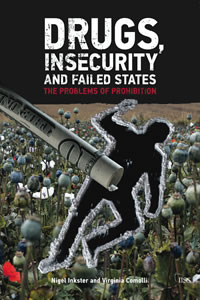The US Court of Appeals in DC heard oral arguments Tuesday in medical marijuana advocates' bid to overturn the DEA's decision to not reschedule the plant.
An effort to reform California's draconian Three Strikes law was foiled at the last minute in 2004, but this year, Proposition 36 appears set to cruise to victory. No more 25-to-life for getting caught with drugs after two previous felonies if it passes.
With marijuana legalization initiatives heading to the ballot, some with a good chance of passage, and with growing international support for a real debate on prohibition, people are talking about drug policy like they never have before. Our new book offers will help you be part of that conversation, while our new video offer will remind you why we should be angry too.
That 10-point or so lead that Colorado's Amendment 64 has been holding onto has begun to shrink, according to a new poll, and the measure is now just under 50% with 9% undecided.
With less than three weeks to go until election day, there is a lot of activity on the state-level initiative front -- but not everywhere. Some campaigns are staying mighty quiet, and that's a strategy that could work for them.
The federal rescheduling petition got a day in court, the feds keep up the pressure in California, a dispensary may actually open in New Jersey, and those are just the headlines. There's much more going on, too.
New Jersey Gov. Chris Christie has conditionally vetoed a 911 Good Samaritan law aimed at avoiding fatal drug overdoses. He's afraid it might let drug dealers "off the hook" and wants the legislature to study the issue for another year-and-a-half instead.
The UK Drug Policy Commission has issued a report calling for the decriminalization of drug possession, among other reforms.
Allegations of torture and mistreatment by Mexican soldiers and police have increased dramatically as President Calderon wages his drug war, Amnesty International says in a new report.
A case with First Amendment implications has emerged in Texas, where a Mesquite woman was arrested and charged with a felony for outing a Mesquite police officer as an undercover narc.
A Louisiana man fleeing a drug bust crashed and died. He becomes the 50th person to die in US domestic drug law enforcement operations so far this year.
A St. Louis cop is headed for federal prison for re-selling seized pot, a Camden cop is heading there, too, for running amok in the drug war, a Miami cop awaits sentencing for transporting what he thought was cocaine, and a Baltimore jail guard gets popped for smuggling weed and psychedelics into the jail.
The medical marijuana defense group Americans for Safe Access (ASA) and a number of individual plaintiffs took their case for the rescheduling of marijuana to the US Court of Appeals in the District of Columbia Tuesday. In oral arguments there, they urged the court to order the Drug Enforcement Agency (DEA) to reverse, or at least reconsider, its rejection of a decade-old petition seeking rescheduling.

Now, the battle over rescheduling has moved from DEA and HHS to the federal courts. (safeaccessnow.org)
Marijuana is Schedule I under the Controlled Substances Act, which means the government considers it to have no accepted medical use and a high potential for abuse. Other Schedule I drugs include heroin, ecstasy, and LSD.
ASA is arguing that it should be down-scheduled, past Schedule II, which includes cocaine, methamphetamine and other amphetamines, and powerful
opioid pain relievers (
Oxycontin, morphine,
Fentanyl), to Schedule III, which includes less harmful substances, such as steroids, less-powerful
opioid pain relievers (
hydrocodone, paregoric), and
Marinol, or synthetic THC.
Medical marijuana advocates have thrice petitioned the DEA to consider rescheduling marijuana, citing increased knowledge about the medical efficacy of the herb. The first petition languished for more than two decades before the DEA rejected it; the second was finally rejected after seven years, and it took the agency a decade to reject the most recent one. In the intervening period, 17 states and the District of Columbia have moved to allow for the medical use of marijuana.
The DEA rejected the most recent rescheduling petition last year, saying there was no scientific consensus on marijuana's medical efficacy and that the plant has many "chemical components" that are not well understand.
ASA and the individual plaintiffs appealed the decision in January. (Read the appeal brief
here.)
In oral arguments Tuesday,
ASA counsel Joe
Elford charged that the DEA had ignored accumulating evidence of marijuana's benefits, and so acted "arbitrarily and capriciously" in rejecting the rescheduling petition last year. Federal law requires the agency to take such evidence into account, he said.
Elford also accused the Department of Health and Human Services of creating a Catch-22 for medical marijuana advocates by strictly limiting researchers' access to marijuana, then arguing there is insufficient scientific evidence to merit rescheduling it.
"This game of 'gotcha' will continue indefinitely unless this court intervenes,"
Elford told the three-judge panel.
Despite the federal government's obstructionism,
Elford was able to cite over 200 studies of marijuana's medical efficacy. He argued they helped prove that Schedule I is inappropriate for marijuana, and that its continued placement in Schedule I both harms patients and hampers research.
Elford accused the government of "bias" in its refusal to reschedule marijuana. It ignores its medical benefits and hypes its danger, which is the only way "the federal government could conclude that marijuana is as harmful as heroin and PCP and even more harmful than methamphetamine, cocaine, and opium," he told the court.
But the DEA was prepared to defend its position. Agency attorney Lena Watkins told the court the agency had already considered the evidence and it found the argument that marijuana should be rescheduled unpersuasive.
"They don't have the type of study that would allow them or any other expert to reach a conclusion about the medical utility of marijuana," Watkins argued.
Marijuana is scary stuff, she told the court. The plant has "adverse physical and psychological consequences" and has been "implicated in hundreds of thousands of hospital visits," Wilkins said.
Wilkins did not acknowledge any of the logical caveats to those statements. For example, hospital emergency rooms routinely ask about substance use and that even a person who had used marijuana and then been injured by a drunk driver would be coded as a "marijuana-related" emergency room visit. Additionally, actual marijuana-related emergency room visits typically are anxiety attacks or panic reactions, which are easily treated, and not life-threatening events like potentially fatal hard drug or alcohol overdoses.
"Marijuana is the most widely abused drug in America," Wilkins added, noting that abuse potential is one of the criteria for placing a substance on the schedule.
The court and the opposing attorneys also addressed the issue of standing. In rejecting the appeal of the second petition--from 1995--that the DEA refused to reschedule, the court never addressed the core issues of the case, instead throwing it out because petitioner Jon
Gettman, a marijuana researcher and former national
NORML executive director, could not demonstrate direct harm from the government's actions.
This time around,
ASA has plaintiff Michael
Krawitz, a disabled Air Force veteran from Virginia who is dependent on the Veterans Administration for his health care and who is prevented from even asking about medical marijuana to treat his pain.
Krawitz is being directly harmed by federal policies and thus has standing,
Elford argued.
"That seems pretty straightforward," said Judge Harry Edwards.
But the DEA's Watkins demurred, arguing that
Krawitz could not legally obtain marijuana anyway because Virginia has not approved its medical use.
At the end of the day, it was unclear whether medical marijuana advocates had won their argument before the panel of veteran judges. The jurists appeared to question whether the courts had the right to second-guess the DEA.
"The real question is to what extent we have to defer to the agency," said Judge Harry Edwards.
"Don't we have to defer to their judgment?" asked Judge Merrick Garland. "We're not scientists. They are."
The pair of judges said they would not overturn the DEA's decision unless they found it to be "arbitrary and capricious." But that, of course, is precisely what Alford and the plaintiffs argued it is.
The appeals court will not hand down its decision for some months.
back to top
In 1998, Bernice Cubie got caught with $10 worth of cocaine. Since it was her third offense, although she had never hurt anyone, she was sentenced to up to life in prison under California's Three Strikes law. Now 59 years old, Cubie has served more than 14 years in prison at a cost to California taxpayers of around $700,000 dollars.
Barring something changing fast for Ms.
Cubie, she will die in prison. The African-American grandmother has already lost one kidney in prison and is now suffering from an advanced form of terminal cancer. Although she walks only with the assistance of a walker and had a parole plan to be housed with her daughter and a drug treatment counselor, as well as the recommendation of prison doctors, the California parole board denied her compassionate release petition. She has less than six months to live, but will not have a parole opportunity until 2023.
Shane Taylor is another California Three Strikes lifer. He's also been behind bars since 1998, when he was convicted and sentenced to life for possession 0.14 grams of methamphetamine. His previous two convictions were for burglaries days apart in which nothing was taken but a checkbook, and police recovered that before any money was withdrawn.
The judge who sentenced Taylor now regrets that decision and speaks out publicly in favor of his release. So does the district attorney who prosecuted him under the Three Strikes law. But although he has already served 13 years in prison for little more than a tenth of a gram of meth, he won't be eligible for parole for another dozen years.
That is, unless California voters next month approve
Proposition 36, a measure designed to amend the Three Strikes law so that only prisoners whose third strike was a "serious" or "violent" offense under California statute would be subject to life imprisonment. In addition to modifying future Three Strikes sentencing, the measure would also impose some retroactivity, allowing prisoners currently serving Three Strikes life sentences to seek a judicial order to reduce those sentences to no more than twice the sentence for a first offender.
Proposition 36 could save the cash-strapped state $100 million a year, according to the Legislative Analyst's Office. Between the prospect of budgetary savings and the desire to undo egregious sentences imposed on small-time, nonviolent offenders, including many drug offenders, the measure looks likely to appeal to California voters.
According to
a bevy of recent polls, Proposition 36 appears to be sitting pretty. A September California Business Roundtable poll had it winning 72% to 19%, a September Los Angeles Times poll had it winning 65% to 20%, and an October Business Roundtable poll had it winning by 72% to 20% in a survey that included strong support, likely support, and leaning toward. The lone outlier was a September SurveyUSA poll that had Prop 36 with 43%, with 23% opposed and a whopping 34% undecided, but even in that poll, support for the measure was nearly double opposition.
"Things are looking pretty positive,"
Yes on 36 spokesman Dan Newman reluctantly conceded. "Most of the public polling has it around 70%, and people are voting now. We've built an unprecedentedly broad and deep coalition with support from law enforcement leaders, civil rights groups, the district attorneys of big cities, and fiscal conservatives like Grover Norquist."
Indeed, the campaign's
list of endorsements is impressive, and includes Los Angeles Mayor Villaraigosa, Los Angeles County District Attorney Steve Cooley, and LAPD Chief Charlie Beck and former Chief Bill Bratton. Also on board are San Francisco DA George Gascoigne and Santa Clara County DA Jeff Rosen, along with several dozen other law enforcement and elected officials.
"The state should not allow the misallocation of limited penal resources by having life prison sentences for those who do not pose a serious criminal threat to society. The punishment should fit the crime," said Cooley.
Somewhat more head-turning is support from conservatives, such as Norquist and his Americans for Tax Reform. It's about the money, said Newman.
"Conservatives support this largely for fiscal reasons," he explained. "They don't like seeing us waste $100 million a year at a time of looming fiscal crisis. This is money that could be used for schools or to prevent crime."
Not everyone supports the initiative.
Mike Reynolds, the author of the original Three Strikes legislation, wrote that initiative after his teenage daughter was shot and killed by a repeat offender in an attempted purse snatching in Fresno. He says that $100 million a year is a small price to pay to keep dangerous offenders locked up.
"Three Strikes passed and California's crime rate dropped in half," said Reynolds. "There is no way we should change something that has been so successful," he argued. "The reductions in crime have really saved the state an enormous amount of money and increased our quality of life. You have half the chance of being a violent crime victim than before Three Strikes."
But attributing the drop in crime in California to the Three Strikes law may be a stretch. Violent crime rates have been dropping around the country for the past two decades -- in states with and without harsh sentencing mechanisms. Criminologists are divided on the causes of the drop.
"The initiative campaign is quick to point out their support from law enforcement, but only three of 58 district attorneys, one sitting police chief, and one retired chief support it," Reynolds said. "Virtually all major agencies in the state are against this. Everything with a badge and a uniform short of the Cub Scouts is against this thing. I've never seen such a full court press."
But despite all that supposed law enforcement enmity, there has been very little opposition presence this year. That's a change from 2004, when Proposition 64, which also would have amended the Three Strikes law, looked set to pass until the final weeks, when Gov. Schwarzenegger and actor Martin Sheen helped law enforcement raise a late clamor and send the initiative down to defeat.
Reynolds' opposition to Three Strikes reform is understandable given his personal history, said Newman, but it shouldn't get in the way of smart public policy.
"I'm sorry for the unbelievably tragic loss he suffered," he said. "It's the worst thing anyone could have to go through, and I can't imagine the pain and suffering that must bring, but for folks who want to prevent serious and violent crimes in the future, the best way to do that is to ensure that law enforcement resources are focused on those dangerous and violent criminals. We are facing dual challenges of fiscal crisis and prison overcrowding," Newman continued. "We have to be smart and make some wise decisions in terms of how we deal with this. Will we release someone who recently committed a violent crime or will we release someone who got caught with a joint 30 years ago and is now in a wheelchair?"
California voters are already making their choice through early voting. We will know how they feel when the final votes are tallied on election day.
back to top
Dear Drug War Chronicle reader:
With marijuana legalization initiatives heading to the ballot, some with a good chance of passage, and with growing international support for a real debate on prohibition, people are talking about drug policy like they never have before. And so two of our three new offers for donating members come from the academic world rather than activist reformer circles:
Marijuana Legalization: What Everyone Needs to Know and
Drugs, Insecurity and Failed States: The Problems of Prohibition.
This is also a time of continuing outrages in the government's drug war, including the federal campaign against medical marijuana. And so our third new offer is the DVD
Lynching Charlie Lynch, by director Rick Ray, telling the story of one of California's most respected and responsible medical marijuana providers, now facing time in federal prison. (Follow the three links above for Drug War Chronicle reviews of each of these works.)
Donate $35 or more to StoptheDrugWar.org, and you will be eligible for a complimentary copy of any one of these items. Donate $65 or more and you'll be eligible for any two. Donate $95 or more and you can receive all three. (Each of these items, and each combination along with other available items, can be found in the "membership premiums" section of our
online donation form, under the indicated minimum total.)
At a time like this -- when people are talking about drug policy like never before -- the movement's internet strategy is also more important than ever before. So please support our work with a generous donation by credit card or PayPal today. You can also donate by mail -- info below.
Lastly, please note that even with a nonprofit, bulk discount, we spend a significant amount to purchase these items and send them to you -- if you can afford to donate more than the minimum, or to supplement your donation with a continuing monthly contribution, I hope you'll consider doing so. If gift items are not important to you, I hope you'll consider sending a donation that's entirely for our work.
Donations to our organization can be made online at
http://stopthedrugwar.org/donate, or they can be mailed to:
DRCNet Foundation (tax-deductible), P.O. Box 18402, Washington, DC 20036; or Drug Reform Coordination Network (non-deductible for lobbying), same address. (Contact us for information if you wish to make a donation of stock.)
Thank you for standing with us to stop the drug war's cruelties and meet the opportunity this time offers to make a brighter future. And don't get discouraged by the challenges our movement and the cause are currently facing:
Time, and the truth, are on our side!
Sincerely,

David Borden, Executive Director
StoptheDrugWar.org
Washington, DC
http://stopthedrugwar.org
back to top
A SurveyUSA poll released Sunday shows Colorado's marijuana legalization initiative, Amendment 64, still winning, but with a shrinking lead and with approval under 50%. A University of Denver poll released a week earlier had Amendment 64 right at 50%. These latest polls only add to the sense that the marijuana legalization vote in Colorado is going to be a nail-biter.
The
SurveyUSA poll had support for Amendment 64 at 48%, with those opposed at 43%, and 9% undecided. That's a five-point lead, down from 11 points in a
SurveyUSA poll done five weeks ago.
According to the latest poll, the initiative is losing support among women, who five weeks ago favored it by 10 points, but now oppose it by eight. It is also losing support among people with a college degree, who favored it by nine points five weeks ago, but now oppose it by five. It is also losing ground among upper-income voters.
The erosion of support for drug reform initiatives in the final weeks of a campaign is not unexpected. Voters begin to finally pay attention as the campaign season goes into its frantic final weeks, and the opposition gears up its efforts to defeat them. The
Campaign to Regulate Marijuana Like Alcohol, though, has a pre-paid $700,000 advertising campaign ready to go and is aiming to win over those groups where support is weakening.
The latest
SurveyUSA poll also had President Obama and Republican challenger Mitt Romney in a virtual dead heat, with Romney winning 48% to 47% head-to-head and 46% to 45% in a three-way race that includes Libertarian Gary Johnson polling at 2%. Johnson supports marijuana legalization, and some reform activists have been hoping that he will pull pro-legalization voters away from the major party candidates, but this poll doesn't suggest that is the case.
(This article was published by StoptheDrugWar.org's lobbying arm, the Drug Reform Coordination Network, which also shares the cost of maintaining this web site. DRCNet Foundation takes no positions on candidates for public office, in compliance with section 501(c)(3) of the Internal Revenue Code, and does not pay for reporting that could be interpreted or misinterpreted as doing so.)back to top
With less than three weeks to go until election day, there is a lot of activity on the state-level initiative front- -- but not everywhere. Some campaigns are staying mighty quiet, and that's a strategy that could work for them. Let's get to it:
National
On Monday,
former DEA heads and drug czars reiterated their call for the Justice Department to attack marijuana legalization initiatives. The drug warriors are attempting to pressure Attorney General Eric Holder to take a public stand against the initiatives.
"Next month in Colorado, Oregon and Washington states, voters will vote on legalizing marijuana," Peter
Bensinger, the moderater of the call and former administrator of the DEA during the Ford, Carter and Reagan administrations, began the call. "Federal law, the US Constitution and Supreme Court decisions say that this cannot be done because federal law preempts state law. And there is a bigger danger that touches every one of us -- legalizing marijuana threatens public health and safety. In states that have legalized medical marijuana, drug driving arrests, accidents, and drug overdose deaths have skyrocketed. Drug treatment admissions are up and the number of teens using this gateway drug is up dramatically."
That prompted
a response from the Marijuana Policy Project: "These former officials are stuck in the mindset that we can arrest our way to decreased marijuana use," said Morgan Fox, the group's communications manager. "This policy has obviously failed and at great cost. We need to treat marijuana as a public health issue and stop wasting resources arresting adults for using something that is demonstrably safer than alcohol. Unfortunately, people like these former officials, who have made careers out of keeping marijuana illegal, are promoting federal interference against reform efforts. Individual states need to be free to experiment with polices that give control of the marijuana market to legitimate businesses instead of criminals and that do not include arrest or incarceration. The federal government should be encouraging states to explore alternatives to ineffective policies rather than expensively and uniformly pursuing continued failure."
Arkansas
On Monday,
the Arkansas Pharmacists Association said it would oppose Issue 5, the Arkansas Medical Marijuana Act. The association said it opposed the measure because it does not incorporate pharmacists and would lead to conflicts with federal law. The pharmacists said they weren't taking a position on medical marijuana, only on the initiative. They said if Arkansas wants medical marijuana, it should pursue regulatory changes to get it rescheduled.
On Wednesday,
the Arkansas Times endorsed Issue 5. The Little Rock alternative weekly said it has "misgivings" about legalizing medical marijuana given federal opposition, but said it was always a safe bet to line up opposite the "hateful" Arkansas Family Council, which opposes it.
California
See our feature story on the Three Strikes sentencing reform initiative, Proposition 36, this week
here.
Colorado
Last Friday,
musician Melissa Etheridge endorsed Amendment 64, the state's legalization initiative. She appears on a new radio ad and talks about her personal experience with marijuana, first as a cancer patient, and then as a legalization advocate.
On Sunday,
a new poll had Amendment 64 still winning, but with a shrinking margin. The initiative was ahead 48% to 43%, but was seeing declines in support among women, people with a college degree, and some other demographics. A poll a week earlier had Amendment 64 at 50% with a 10-point lead.
On Monday,
the United Food and Commercial Workers endorsed Amendment 64, saying it would create jobs and bolster the state and local economies.
UFCW Local 7, which represents 25,000 workers in Colorado and Wyoming is the state's largest union. "Amendment 64 will foster economic growth and enhance public safety for our members across Colorado," said
UFCW Local 7 president Kim Cordova. "Removing marijuana from the underground market and regulating it similarly to alcohol will create living-wage jobs and bolster our state and local economies with tens of millions of dollars in new tax revenue and savings. By taking marijuana off the streets and putting it in retail stores, we can stop steering money toward gangs and drug cartels, and start directing it toward legitimate, job-producing Colorado businesses."
On Tuesday, two dozen state clergy and faith leaders endorsed Amendment 64. "How we punish people and what we punish them for are central moral questions," said the Rev. Bill
Kurton. "If a punishment policy fails to meet its objectives and causes harms to humans, I believe we have a moral obligation to support change. Our laws punishing marijuana use have caused more harm than good to our society and that is why I am supporting replacing marijuana prohibition with a system of strict regulation with sensible safeguards."
Massachusetts
The buttoned-down Question 3 campaign is keeping mighty quiet as its medical marijuana initiative maintains a comfortable lead in polls.
MontanaThe I-124 campaign, which seeks a "no" vote to repeal the legislature's gutting last year of the state's voter-approved medical marijuana law, is also staying quiet.
Oregon
Last Friday, Clear Channel Communications agreed to take down a series of billboards put up by groups tied to the Florida-based Drug Free America Foundation, operated by long-time drug warriors Mel and Betty Sembler. The communications giant acted after online protests by Women for Measure 80, the state's legalization initiative. The billboards featured a photograph of a young woman who appeared strung out on crack or meth, not marijuana. "The ads protesting marijuana are being removed because our policy is transparency of advertising campaigns and the advertisers who are sponsoring them," said a Clear Channel spokesman. "These ads include a misleading website that we believe needed to honestly represent the advertiser so the ads are being removed."
On Monday, Measure 80 supporters rallied at the state capitol. Several dozen showed up to show their support.
Washington
Last Thursday, researchers reported that there had been 240,000 marijuana possession arrests in the state in the past 25 years. Police made more than half of those marijuana arrests in just the last 10 years. Nearly four out of five arrested were under age 35, and ethnic minorities were arrested at rates disproportionate to their makeup of the population. The report was prepared by the Marijuana Arrest Research Project, which has produced studies of marijuana possession arrests in New York, California, and major US cities.
Last Friday, I-502 proponent Rick Steves was heckled at the state capitol rotunda by about 20 noisy protestors, including medical marijuana advocates who bitterly oppose the initiative. Four or five of the protestors were escorted out of the building by state police, and Rep. Sam Hunt, an I-502 supporter, got into a scuffle with one of the opponents.
back to top
The federal rescheduling petition got a day in court, the feds keep up the pressure in California, a dispensary may actually open in New Jersey, and those are just the headlines. There's much more going on, too. Let's get to it:
National
Last week,
the National League of Cities adopted a resolution on medical marijuana. The resolution calls on the federal government "to consider a precise interpretation of the CSA to recognize and address whether the medicinal use of marijuana in prescribed circumstances is or is not in conflict with the CSA." The cities complained that they are wasting valuable resources trying to address the conflict between state laws allowing medical marijuana and the federal government's absolutist position.
On Tuesday,
the DC Court of Appeals heard oral arguments on an appeal of the DEA's decision to reject the marijuana rescheduling petition. Click on the link to read our feature story on it.
Arizona
Last Friday,
a medical marijuana patient sued the state after police seized her marijuana-infused oil.
Charise Voss
Arfa claims police wrongfully considered the oil labeled "Soccer Moms Tincture" a narcotic instead of marijuana. A tincture is typically an alcoholic extract of plant or animal material or solution. The lawsuit argues the statute defining cannabis is too vague and should not apply to medical-marijuana cardholders who legally participate in the state program. The lawsuit asks the courts to order police to return the oil; to ban police from arresting, prosecuting or taking property from medical-marijuana cardholders; and to declare the state's criminal statute related to cannabis void as it applies to medical-marijuana patients and caregivers.
California
Last Wednesday,
the DEA and local police raided seven Long Beach dispensaries and arrested more than 40 people. The raid is just the latest, though possibly the largest, crackdown on medical marijuana in Long Beach since the city's ban went into full effect in August. The ban was a reaction by city officials to a court ruling that the city can't regulate the drug because it is illegal under federal law. City Hall had worked for two years to come up with a permitting system and regulations to control the number of collectives, and once that law was voided, the city council voted to ban medical marijuana rather than risk its unregulated proliferation throughout the city.
Last Friday,
G3 Holistic dispensary owner Aaron Sandusky was convicted of federal marijuana charges by a jury that heard no mention of medical marijuana. Sandusky, who operated three Southern California dispensaries, was convicted on two charges, but the jury could not agree on four other counts. He is now looking at a mandatory minimum 10 years in federal prison, and up to a life sentence. Sandusky, who had been free on bail, was immediately jailed.
Also last Friday,
Concord elected officials said they are considering an ordinance to restrict medical marijuana cultivation. The move comes after complaints from residents about smelly outdoor grows. "Perhaps looking at having the growth indoors instead of outdoors, that would take care of some of the major concerns we have," said Mayor Ron Leone.
Also last Friday,
activists filed papers with the city of Los Angeles for a May referendum to regulate -- not ban -- dispensaries in the city. The
Angelenos for Safe Access Committee needs to gather enough signatures to make the ballot. The proposed initiative would increase the city tax on dispensaries from 5% to 6% of revenues, require dispensaries to register with the city, require background checks for operators and employees, and require that dispensaries respect distance requirements from schools and churches. The move comes after the city council first banned dispensaries, then voted to un-ban them in the face of another, successful petition drive.
Also last Friday,
the city of Covina took legal action to shut down a dispensary. The city attorney had sought and won a temporary restraining order to shut down the
LPC Center, which had opened in the city during the summer, but the dispensary didn't shut its doors. The new complaint alleges that the dispensary operators lack a business license and that the dispensary is a public nuisance because it is in violation of the city's municipal code. There will be a hearing next week where a judge will consider granting Covina a preliminary injunction to force the cooperative to close. According to the complaint, "distributing marijuana, whether for medical purposes or otherwise, is not a permitted use" under Covina's municipal code.
Last Saturday,
voters in Eagle Rock rejected most of the medical marijuana slate in neighborhood council elections. The neighborhood has been hit hard by police actions against dispensaries, with support from the neighborhood council. Dispensary operators and supporters had called on Los Angeles residents to vote in the neighborhood election in support of dispensaries, leading to charges of unfair election practices.
On Monday,
DEA agents visited some LA dispensaries that had received federal threat letters in September. Agents visited up to 21 dispensaries, reminding them that they needed to shut down. "We do have a couple agents doing follow up," said DEA spokeswoman Sarah Pullen. "It's routine since these letters are going out. We wanted to determine the status of where these places are at." In late September, the DEA targeted 68 dispensaries with threat letters and raided three. The feds aim at wiping out dispensaries in Eagle Rock and downtown LA.
On Tuesday,
DEA agents visited an Eagle Rock dispensary, prompting it to close its doors. The Together for Change dispensary had opened in May, after the American Eagle Collective, which operated at the same location, was raided and shut down by LAPD. Together for Change is one of the 68 dispensaries targeted by September federal threat letters.
Also on Tuesday,
the Sacramento city council moved to prohibit outdoor marijuana grows. The council voted 8-1 to direct city staffers to draft an ordinance barring them. Council members said the grows were a magnet for crime and a nuisance to neighbors. The council also voted to keep in place existing location restrictions on medical marijuana dispensaries. Those restrictions prohibit the shops from operating within 1,000 feet of other dispensaries, 300 feet from residences and 600 feet from schools and parks. The city has a moratorium on new dispensaries following the federal crackdown, but allows 17 already existing dispensaries to operate.
Colorado
As of the end of July, the
number of registered medical marijuana patients passed the 100,000 mark for the first time since September 2011. That's according to figures released last week by the state Department of Public Health and Environment. The number of patients had peaked at more than 128,000 people in June 2011 before shrinking over a five-month period to just over 80,000. The decline was variously attributed to increased dispensary regulations, a glut of medical marijuana available from growers, and the $90 fee for registering.
On Tuesday,
Carbondale trustees narrowly rejected a dispensary application. They voted 4-3 to deny
CMED a business permit, even though the dispensary has been open for two years.
CMED owner Michael
Weisser, who has been caught in a regulatory wringer the entire time, demanded to know whether the town was shutting him down and was told the trustees would let him know."You'd better do it quick, because I'm going to move immediately for an injunction against the board,"
Weisser replied.
Maine
Last Saturday,
Maine police returned plants stolen from a medical marijuana grower in Ellsworth. Police initially hesitated to return the plants, citing concerns about violating federal law, but then relented. The grower said he was able to save only part of the crop.
Michigan
Last Thursday,
the Michigan Supreme Court has heard oral arguments in a case that will help determine whether dispensaries can sell marijuana to patients who don't grow their own. The case involves a Mount Pleasant dispensary that allowed members to sell marijuana to each other. It was prosecuted by Isabella County authorities, and the conviction was upheld last year by a state appeals court.
New Jersey
On Monday,
the Greenleaf Compassion Center in Montclair received state permission to open. It would be the first in the state, and the permission comes nearly three years after the Garden State approved medical marijuana.
On Wednesday,
the Compassionate Care Foundation said it wouldn't open a dispensary until next year. The foundation, which plans to open a dispensary in Egg Harbor Township near Atlantic City, has faced delays because of the state's extensive background check process.
New Mexico
On Monday,
advocates announced a campaign to keep PTSD as a qualifying condition for the state's medical marijuana program. PTSD is currently a qualifying condition, but its status is threatened by a request to remove it. Advocates aid more than 3,000 New Mexico residents with PTSD are enrolled in the state's program. The advocates, including the New Mexico Medical Cannabis Patients Alliance, the Drug Policy Alliance, and others are calling the campaign
Don't Take Away Our Medicine. "We deserve access to effective medical treatments whether we’ve just come home from combat or we are suffering debilitating symptoms from other trauma," said Chris
Hsu, NM Medical Cannabis Patient’s Alliance’s Vice President.
Rhode Island
On Monday,
the Rhode Island Medical Society joined a lawsuit against the state health department over its recent decision to only allow physicians -- not nurse practitioners and physicians' assistants -- to sign medical marijuana applications. The state ACLU had sued last week on behalf of the Rhode Island Patient Advocacy Coalition, Rhode Island Academy of Physician Assistants and a Bristol patient. Applications signed by nurse practitioners and physician’s assistants had previously been accepted. The medical society said the new policy was arbitrary and that doctors needed to be able to delegate responsibilities to other medical professionals.
back to top
New Jersey Gov. Chris Christie (R) Friday conditionally vetoed the 911 Good Samaritan Emergency Response Act, which would have exempted from criminal prosecution people who participated in or witnessed illegal drug use after the call for help for an overdose victim. The governor vetoed the bill because it would have let drug dealers "off the hook," he said.

Chris Christie is more worried about Bad Samaritans than overdosing drug users. (state.nj.us)
"It's one of these things that sound good in the abstract,"
Christie told a town hall-style meeting a day earlier in Mount Laurel. "How about if they're not a Good Samaritan? How about if they're the (person) who supplied the drugs? That was my problem with the bill."
Christie said he supported harm reduction strategies, including drug treatment for low-level offenders, but that the Good Samaritan bill as passed was not the right answer.
"What I'm not willing to do is to give is to give people who commit harm to other people a free pass just because they picked up the telephone," he said. "The legislature has got to make the bill better. If they make the bill better, I'll be happy to consider signing it."
His conditional veto means the bill goes back to the legislature, which he has instructed to "study the issue of drug-overdose reporting" for 18 months and recommend "a comprehensive approach."
In the meantime, more and more New Jersey residents are dying of drug overdoses every year. Some 700 died in 2009, 884 in 2010, and about 1,000 last year, according to the state medical examiner.
The bill passed the legislature with bipartisan support earlier this year and is similar to Good Samaritan laws passed in 11 other states.
back to top
In a report six years in the making, the United Kingdom Drug Policy Commission, a non-governmental advisory body chaired by Dame Edith Runciman, has called for a reboot of British drug policy and for decriminalizing the possession of small amounts of drugs for personal use.
The report,
A Fresh Approach to Drugs, found that the UK is wasting much of the $4.8 billion a year it spends fighting illegal drugs, and that the annual cost to the country of hard drug use was about $20 billion. A smarter set of drug policies emphasizing prevention, diversion, and treatment would be a more effective use of public resources, the report found.
Some 42,000 people in the UK are convicted each year of drug possession offenses and another 160,000 given citations for marijuana possession. Arresting, citing, and jailing all those people "amounts to a lot of time and money for police, prosecution, and courts," the report said.
"To address these costs, there is evidence to suggest that the law on the possession of small amounts of controlled drugs, for personal use only, could be changed so that it is no longer a criminal
offence. Criminal sanctions could be replaced with simple civil penalties, such as a fine, perhaps a referral to a drug awareness session run by a public health body, or if there was a demonstrable need, to a drug treatment program. The evidence from other countries that have done this is that it would not necessarily lead to any significant increase in use, while providing opportunities to address some of the harms associated with existing drug laws," the report recommended.
"Given its relatively low level of harm, its wide usage, and international developments, the obvious drug to focus on as a first step is cannabis, which is already subject to lesser sanctions than previously with the use of cannabis warnings. If evaluations indicated that there were no substantial negative consequences, similar incremental measures could be considered, with caution and careful further evaluation, for other drugs," the report said.
But while the commission was ready to embrace decriminalization, it was not ready to go as far as legalizing drug sales.
"We do not believe that there is sufficient evidence at the moment to support the case for removing criminal penalties for the major production or supply offenses of most drugs," it said.
Still, policymakers might want to consider lowering the penalties for growing small numbers of marijuana plants to "undermine the commercialization of production, with the associated involvement of organized crime."
The report also called for a review of harsh sentences for drug offenses, a consistent framework for regulating all psychoactive substances -- from nicotine to heroin -- and for moving the policy prism through which drug policy is enacted from the criminal justice system to the public health system.
But the Home Office, which currently administers drug policy in Britain, wasn't having any of it. Things are going swimmingly already, a Home Office spokesperson said.
"While the government welcomes the
UKDPC's contribution to the drugs debate, we remain confident that our ambitious approach to tackling drugs -- outlined in our drugs strategy -- is the right one," the spokesperson said. "Drug usage is at its lowest level since records began. Drug treatment completions are increasing and individuals are now significantly better placed to achieve recovery and live their lives free from drugs. "I want to take this opportunity to thank the
UKDPC for its work in this area over the past six years."
back to top
Mexico must take decisive action to rein in systematic and widespread use of torture, ill-treatment, and other human rights abuses, which have increased dramatically since outgoing President Felipe Calderon unleashed the military to fight the country's so-called cartels nearly six years ago, Amnesty International said in a report released last Thursday.

Mexican military displaying detainees (sedena.gob.mx)
The report,
Known Abusers, But Victims Ignored: Torture and Ill-Treatment in Mexico, documents the increase of cases of torture and ill-treatment by the police and military forces, the lack of effective investigations and almost total lack of prosecutions, and the juridical weaknesses and lack of political will that allow such abuses to go unpunished and even allow testimony obtained through torture to be used to convict its victims.
An estimated 60,000 people have been killed and another 160,000 displaced in prohibition-related violence in Mexico since Calderon made waging the drug war the centerpiece of his then new administration in December 2006. The cartels are responsible for much of the mayhem, but as the violence intensified, human rights complaints filed with federal authorities have more than quadrupled, from 392 in 2007 to 1669 in 2011. Nearly 5,000 federal complaints have been filed overall, and those are just the cases when someone bothered to go through the formality of a process that too often produces no results.
And, the Amnesty report shows, it is mainly just a formality. According to the report, federal prosecutors prosecuted no torture cases in 2007 or 2008, one in 2009, and filed four more in 2010. Similarly, the number of state level torture prosecutions can be counted in the single digits each year since 2007.
"The
Calderón administration has effectively turned a blind eye to the 'torture epidemic' we've been witnessing in Mexico," said Rupert Knox, an Amnesty International Mexico researcher. "The protection of human rights has been ignored or sidelined in favor of the government's strategy of militarized combat of organized crime and drug cartels. Across Mexico criminal suspects often face detention and trial on the basis of evidence obtained under torture and ill-treatment while prosecutors and courts fail to question seriously information or evidence obtained in this manner."
Miriam
Isaura López Vargas is a case in point. She was arbitrarily detained in
Ensenada, Baja California, on February 2, 2011. During interrogation in a military barracks in Tijuana by a civilian federal prosecutor, members of the army reportedly sexually assaulted her, subjected her to near asphyxiation and stress positions, and threatened her in order to coerce her into signing a confession falsely implicating other detainees in drug trafficking offenses.
"I heard a man scream many times, they kept on asking him, 'Where are the guns, where are the drugs?' A bit later I heard 'Take him away and bring me the next one.' I heard them open a door," Lopez Vargas recounted. "They put a wet cloth over my face, when I tried to breathe. I felt the wet cloth, it became difficult to breathe, I then felt a stream of water up my nose, I tried to get up but couldn't because they had me held down by my shoulders and legs… someone was pressing down on my stomach, they did this repeatedly as they kept on asking the same questions."
A week later, she was transferred to Mexico City and held without being brought before a judge until April 26, 2011, when she was charged with drug offenses. The following month, the case against her collapsed, and she was released by a federal judge. She filed a complaint alleging she was tortured; it has yet to be acted on.
The involvement of the Mexican military in the Lopez Vargas is not unusual. Across Mexico, military personnel performing policing functions have held thousands of suspects in military barracks before presenting them to prosecutors. In this context, there have been numerous reports of torture and ill-treatment while in military custody.
"Federal authorities have shown an absolute lack of leadership to combat torture and ill-treatment seriously at the state level or federal level," said Knox. "The only way to tackle torture and ill-treatment is by ensuring that all cases are properly investigated and those responsible, brought to justice. In a letter sent to Amnesty International, Mexican President elect Enrique
Peña Nieto committed to implement policies and take action to end torture, we urge the authorities to abide by their promises."
back to top
In a case that would appear to raise First Amendment questions, a Mesquite, Texas, woman has been arrested and charged with a felony after she allegedly posted a photograph of an undercover narcotics officer on Facebook and identified him as a narc. Melissa Walthall, 30, was charged with felony retaliation after Mesquite police deemed her post "a viable threat to the officer's safety."

Do citizens have the right to identify police officers? (earthisland.org)
The photo was copied from the officer's own Facebook page.
Walthall got into trouble after an acquaintance of hers went to the Mesquite Police and told them a photograph of a man labeled "Undercover Mesquite Narcotics" had appeared on her newsfeed. "Anyone know this bitch?" asked the caption below the photo.
Walthall reportedly told police she had seen the photo on a flyer several weeks earlier and had posted it on Facebook because a friend of hers was unhappy with the narc's testimony in a drug trial. Walthall refused to snitch out her friend, but a police computer search led them to a George Pickens.
Pickens told police he and his brother, Bobby
Stedham, had begun researching the narc online and found his Facebook page and photograph, then used the photo to make flyers with the intent to display them locally "like garage sale signs."
Stedham now also faces a felony retaliation charge, while Pickens was hit with drugs and weapons charges after police found an ounce of meth and a sawed-off shotgun at his residence.
Law enforcement spokesmen defended the arrests.
"It's a very dangerous situation," said Kevin Lawrence, executive director of the Texas Municipal Police Association. "If you're trying to infiltrate a cartel, a drug ring, a gang, one of the keys is people have to believe you're not an officer. Anything that hints at tying you to law enforcement is very dangerous," he said.
Walthill and
Stedham's flyers and Facebook posts did not call for retaliation against the narc, but merely identified him, raising interesting First Amendment questions. It will be interesting to see if they fight the charges, and if they get any help from civil libertarians.
back to top
A Morgan City, Louisiana, man was killed last Wednesday when he got into a fatal car crash while attempting to flee deputies doing a narcotics investigation.
Irvian Singleton, 44, becomes
the 50th person to die so far this year in domestic drug law enforcement operations.
According to the Louisiana State Police, Singleton was fleeing from St. Mary Parish deputies who were attempting to stop him for a drug investigation. His car crossed the center line as he fled from pursuing deputies, and he struck another vehicle, which flipped his car over. Singleton, who was not wearing a seat belt, was pronounced dead at the scene. The other driver was hospitalized with non-life threatening injuries.
According to the St. Mary Parish Sheriff's Department, members of the Narcotics Division suspected Singleton had drugs in the vehicle when he drove away.
"It is believed right now that the suspect did possibly have narcotics in that vehicle," the sheriff's department said. "So, as a result, we actually have a dual investigation that's taking place right now with the state police as well as the sheriff's department."
back to top
A St. Louis cop is headed for federal prison for re-selling seized pot, a Camden cop is heading there, too, for running amok in the drug war, a Miami cop awaits sentencing for transporting what he thought was cocaine, and a Baltimore jail guard gets popped for smuggling weed and psychedelics into the jail. Let's get to it:
In Baltimore,
a Baltimore jail guard was arrested last Friday on charges he was smuggling drugs into Central Booking. Guard Michael McCain, 44, was indicted on eight drug counts, including possession with intent to distribute marijuana and
5-methoxy-diisopropyltryptamine, better known as "Foxy
Methoxy," a psychedelic.
In Miami,
a Miami-Dade police officer was convicted last Wednesday of helping to transport shipments of what he thought was cocaine on behalf of a man he believed was a South Beach club manager, but who instead turned out to be an undercover FBI agent. Officer Daniel Mack was convicted of conspiracy to possess and distribute multiple kilos of cocaine and using a firearm in the commission of a crime. He is looking at 15-to-life when he is sentenced in December. Mack was convicted along with two other men of transporting 19 kilos of what they thought was cocaine from Miami Beach to
Aventura. They were paid $25,000 for their efforts. Mack had been suspended without pay pending trial; he will now be fired.
In Camden, New Jersey,
a former Camden police officer was sentenced last Wednesday to 20 months in federal prison for stealing money during drug raids, illegally searching homes, planting evidence, and lying in court. He copped to conspiracy and deprivation of civil rights. Kevin Parry, 32, was one of four Camden police officers arrested on corruption charges in 2010. He got a reduced sentence because he testified in the trial of one of the others. Two of the others also pleaded guilty and are now doing time, while a third awaits sentencing. Camden County prosecutors dropped the charges in 210 cases in which the quartet was involved.
In St. Louis,
a former St. Louis police officer was sentenced Monday to five years in federal prison for seizing marijuana, then working with his brother to sell it on the streets. Larry Davis, 46, was a supervisory agent for a unit doing drug investigations, and he admitted seizing packages containing marijuana from delivery businesses, then selling the weed. His brother also got federal prison time, but only a year.
back to top














